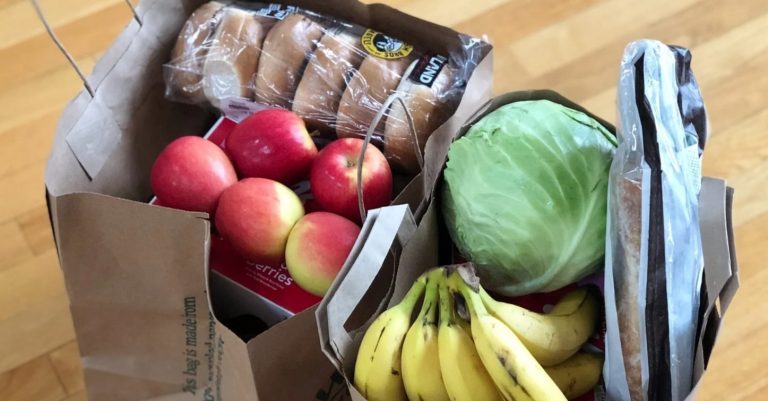Apples, grapes and tomatoes often come in plastic wrap or plastic trays. Huge mountains of plastic are the result. Should we only buy unpackaged fruit and vegetables, or does the plastic wrap in the supermarket sometimes make sense?
Whether it’s apples in a plastic bag or a three-pack of peppers in a plastic jacket. Many types of fruit and vegetables are packed in plastic – including large mountains of rubbish.
Especially if it is disposed of incorrectly, plastic waste damages our environment and pollutes the oceans. One area where a lot of plastic can be saved is food packaging – especially fruit and vegetables.
Plastic waste in private households has increased significantly since the beginning of the corona pandemic. Since March, there has been around ten percent more packaging waste, as the recycling company “Der Grüne Punkt” reported to ZDF. Although commercial waste fell in the same period, more waste was produced overall. Time to reduce plastic waste as soon as possible.
First rule: reduce plastic waste in food packaging

When you buy fruit and vegetables, you often have a choice between individual, unpackaged goods and bulk packs in plastic wrap or trays. Here the choice seems clear: You can buy fresh fruit and vegetables individually and thus avoid plastic packaging, which immediately becomes plastic waste after consumption. Reusable reusable nets are suitable for transport. Because the top priority in waste management is waste avoidance.
Where you have the choice between unpackaged fruit and vegetables and goods with plastic packaging, you should therefore choose the plastic-free variant – even during the corona pandemic you can shop without packaging without hesitation.
The Federal Institute for Risk Assessment (BfR) in Berlin explains that there are no proven cases in which people have contracted the corona virus through contaminated food. Many people continue to reach for unpackaged apples, tomatoes and cucumbers. The trading company REWE, for example, did not notice any changes in buying behavior among its customers during the Corona crisis.
Sometimes packaging makes sense
Unfortunately, it’s not always that simple. For some types of fruit and vegetables, packaging may be necessary because the goods would otherwise spoil quickly. Take lettuce, for example: without protective packaging, lettuce spoils quickly in the supermarket and most consumers no longer buy wilted lettuce. In such cases, packaging can prevent unnecessary food waste.
In a regional test, REWE refrained from packaging organic fruit and vegetables for six months and came to the conclusion that the company could save three tons of plastic a year nationwide with unpackaged organic iceberg lettuce. However, due to the lack of a plastic protective cover, an estimated 18.5 tons of organic iceberg lettuce would spoil every year, making them unsellable.
REWE came to similar conclusions with other lettuce, organic broccoli and organic berries. Broccoli, for example, blooms faster without packaging and loses its freshness. Berries are very delicate and also need protective packaging. Packaging is therefore not bad per se: it can protect the fruit and vegetables and keep them fresh for longer. Elaborate plastic packaging is not necessary.
But: If packaging, then as environmentally friendly as possible
Even though certain fruits and vegetables need protection to keep them fresh for longer, multi-wrapped plastic packaging remains harmful to the environment. An interim solution is therefore optimized packaging.
Paper packaging or cardboard packaging is usually an improvement over the plastic cover. Customers often simply want to bundle their fruit and vegetables and therefore choose the grapes or cherry tomatoes in the plastic tray. Cardboard boxes are usually sufficient here – the plastic coating is usually not necessary. Nets, such as those used for onions and potatoes, are also a good alternative.
Packaging solutions at REWE

REWE has drawn conclusions from its unpackaged test: with immediate effect, the supermarket chain will dispense with or optimize packaging for organic fruit and vegetables. As a result, REWE saves 210 tons of plastic and 80 tons of paper every year. Where it is not possible to dispense with the packaging, the packaging is optimized.
PENNY is also permanently converting its organic fruit and vegetable items – the Naturgut Bio-Helden – to plastic-free packaging or unpacking it wherever possible. As alternatives, more environmentally friendly cardboard and paper packaging, cellulose nets or bands and stickers are used – the cucumber, for example, remains completely unpackaged. This can save up to 50 tons of plastic annually in the long term.
All in all, the REWE Group has already made more than 2,000 own-brand packagings more environmentally friendly – true to the motto: avoid, reduce, improve. As a result, REWE and PENNY alone use around 8,000 tonnes less plastic each year.
In order to achieve this amount of savings, REWE and PENNY are reducing the film thickness of the packaging and are often switching from film packaging to adhesive tape rolls or adhesive labels. Customers can also buy a reusable net and carry the fruit and vegetables home in it. Grass paper or FSC-certified paper is used for fruit boxes.
REWE also transfers the findings from the unpackaged test to the conventional range. Recently, for example, ripened avocados and mangoes are no longer packed in trays and optimized packaging is used for berries.
Conclusion: It is mainly up to us as buyers: With our purchase, we determine whether supermarkets will use more or less (plastic) packaging for fruit and vegetables in the future. And also when a food is considered unsellable – if a head of lettuce has a wilted leaf or an organic apple has a small dent, you can still buy and eat it with a clear conscience. If we deliberately choose imperfect pears, carrots or potatoes more often, we reduce food waste and contribute to less food ending up in the bin.

